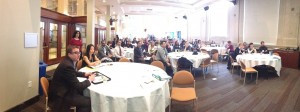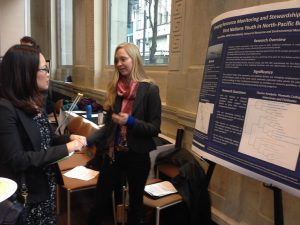The Environmental Managers Association of BC held their annual Workshop on February 19, 2015, bringing together members and guests for a full day of networking and discussion on topics related to Supporting BC’s Natural Resource Sectors toward Successful Development.

Despite resource sector uncertainty, attendance consisted of over 100 professionals representing consulting, First Nations, government, industry, environmental laboratories, environmental law, proponents and regulators. The Workshop provided attendees with an opportunity to hear from government, First Nations and industry leaders, with an aim to explore the successes and challenges associated with navigating First Nations consultation, regulatory and social license processes.
Douglas Eyford opened the day with a keynote address. Known for his landmark report to the Prime Minister of Canada, “Forging Partnerships, Building Relationships – Aboriginal Canadians and Energy Development”, Mr. Eyford provided deep historical context of early treaty negotiations leading up to present day land use and land claims negotiations. The essence of his message focused on the imperative for regular engagement with aboriginal communities. He referred to an urgent need for ‘principled dialogue’ pertaining to resource development with aboriginal communities. Aboriginal people must be convinced that proposed projects will not harm their land or the environment. His recommendations were that Ottawa target funding for aboriginal education, pre-employment skills development and training in order to remove barriers to jobs in the resource industry. That way, when projects are agreed to, the local aboriginal communities will experience broader benefit to their populations.
Elaine Leung with Triton Environmental presented study results on what Social License means to the public in BC, what its sources are, and what project proponents and consultants can do to achieve it consistently going forward (Download Leung Presentation). Paul Harrison with Khtada Environmental Services discussed how meaningful jobs can be created for aboriginal communities involved in resource development projects (Download Harrison Presentation).

This led into a Mining panel discussion led by Mandy Sarfi (Stantec), where Angela Waterman (Vice President – Environment and Technical Affairs with Mining Association of BC), Bob Osborne (Aboriginal Relations Specialist with Stantec), Lana Eagle (Chair for the Aboriginal Relations Committee with the Association of Mineral Exploration BC) and Stephen Morison (Director – Mining Business Sector with SLR Consulting) collectively discussed questions of 1/ The role regulatory regimes play in the encouragement or deterrence for mining companies to develop projects in BC; 2/ Improvements seen in the last two years; 3/ Whether proponents are adequately prepared for the regulatory permitting processes, 4/ If there is a true understanding about the complexities, the timelines, and challenges of navigating this process; 5/ Can First Nations and mining companies truly work together to develop mining resources in B.C?; 6/ What are the real issues and do they relate to the potential environmental impacts of the projects, or are they related to legacy issues that stem from land ownership and respect for First Nations ways that cloud the environmental and permitting processes?
Dr. Paul Richard with Kwantlen Polytechnic University spoke to the benefit of the EMA’s Speaker’s Award which provides $1000 towards a student enrolled in the Environmental Protection Technology program. This award is donated to KPU as a thank you to the speakers and panelists for presenting at the Workshop.
Graham Knox, Director of the Environmental Emergency Program at BC Ministry of Environment provided an update on the progress towards establishing a world leading spill preparedness and response regime for land based spills, as outlined in the Ministry’s Intentions Paper (Download Knox Presentation).
The morning portion ended with the Water Panel – Rick Williams and Sean Jones, of Borden Ladner Gervais LLP. They discussed the history of water regulation in British Columbia and the changes brought in by the new Water Sustainability Act. They highlighted the regulation of groundwater and the adoption of “environmental flow needs” as a key consideration for new licence/short-term approvals, as well as lingering questions around ownership of rainwater (Download Willams/Jones Presentation).
The afternoon portion began with a presentation by Dionysios Rossi, Partner with Borden Ladner Gervais, on the impact of oil and gas development on tanker traffic in British Columbia and other related marine issues (Download Rossi Presentation).
The highlight of the day was the Clean Energy Panel, which featured the Kwoiek Creek Run of River Hydro Plant. Patrick Michell (Economic Development Officer – Kanaka Bar Indian Band) and Matt Kennedy (VP of Environment – Western Region, Innergex) co-authored and co-presented the history of this impressive project that began operation in 2014. The developer of the project is Kwoiek Creek Resources Limited Partnership (”KCRLP”), a partnership between the Kanaka Bar Indian Band of the Nlakapamux First Nation (51%) and Innergex Renewable Energy Inc. The idea for this project started some 15 years ago, as an initiative by Aboriginal Peoples in the area. Mr. Michell pulled no punches in describing what he considered regulatory excesses and double standards that were applied to the project approvals. The project has been a major success not only from a financial perspective, but also in the positive impacts on the lives of Aboriginal Peoples, who are playing the major roles in operations and environmental monitoring. Some 30 individuals were able to leave the welfare rolls for productive and prideful new careers.The Kwoiek Creek plant has been granted EcoLogo certification for its reduced impact on environment. Its logo was designed by Mr. Michell to represent the historical transition in aboriginal relations from a troubled past to a potentially bright future (Download Kanaka/Innergex Presentation and Project Info Sheet).
Daniel Leonard, Director at WorleyParsons Canada, described a proprietary matrix evaluation tool that uses multi-criteria decision analysis that can be used in project evaluation and site selection for LNG projects. It includes factors such as Environmental Sensitivities, Community and First Nations, Geohazards, Safety, Navigation, Regulatory Issues and CAPEX to name a few (Download Leonard Presentation).

Prior to breaking for lunch and networking, Dr. Chris Ling with Royal Roads University presented the results of the final phase of judging in the 1st year of the EMA’s Academic Poster Competition. A summary of the winners and finalists is now available.
Fazil Mihlar, Assistant Deputy Minister from the Ministry of Natural Gas Development presented an update on proposed LNG developments in BC to the 2015 EMA Workshop last month. The presentation outlined the projects that had received a provincial EA Certificate and those that were in the process (Download Mihlar Presentation).
The day closed with the LNG panel led by Tara Wight (WorleyParsons Canada) discussing aboriginal consultation, adaptation of process and communication with John Emery (Senior Aboriginal Engagement Specialist with AMEC), Samantha Singbeil (Public Affairs and Government Relations Manager with Fortis BC) and Peter Wijtkamp (Director – Major Projects with the BC Oil and Gas Commission). Questions posed were 1/ How to communicate to proponents the benefits of sharing the basket of opportunity to those less engaged in the process? 2/ How to define the incentives of equal treatment for all groups in the process; 3/ How to communicate to proponents the benefits of sharing the basket of opportunity to those less engaged in the process? The panel provided valuable insight into some of the changes happening in the permitting and approvals process for LNG development in BC and the intent to communicate and apply these insights to other, non LNG permitting and approvals agencies to reap the successes and learn from the failures.
Following the Workshop, attendees that were interested in meeting with peers over drinks moved over to a local pub for a social mixer atmosphere.
The EMA of BC Workshop would not have been possible without the generous sponsorship of our 2015 partners: Maxxam, Royal Roads University, Borden Ladner Gervais, SFU Faculty of Environment, Port Metro Vancouver, Alexander Holburn Beaudin + Lang, Tervita and WorleyParsons.